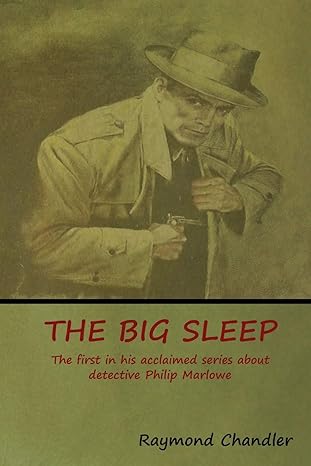| We’ve now posted a total of 17 book reviews. |
| Available now at the Amazon.com website … CLICK HERE! |
| Any and all books purchased through our website cost you nothing extra, but do help support our ongoing efforts. |
 Raymond Chandler’s “The Big Sleep” is the hardboiled novel that still sets the bar: a case file written with a poet’s ear and a brawler’s stance. From the moment Philip Marlowe walks into a decaying mansion and a rich man’s problem, the book establishes its weather—Los Angeles haze, moneyed rot, the faint clink of glassware behind every polite sentence. Chandler doesn’t trade in puzzles so much as pressure. The job is to find out what’s really going on; the joke is that everyone’s already performing a version of the truth that suits them. The result is brisk, wary, and darkly funny. Raymond Chandler’s “The Big Sleep” is the hardboiled novel that still sets the bar: a case file written with a poet’s ear and a brawler’s stance. From the moment Philip Marlowe walks into a decaying mansion and a rich man’s problem, the book establishes its weather—Los Angeles haze, moneyed rot, the faint clink of glassware behind every polite sentence. Chandler doesn’t trade in puzzles so much as pressure. The job is to find out what’s really going on; the joke is that everyone’s already performing a version of the truth that suits them. The result is brisk, wary, and darkly funny.
The pleasure of “The Big Sleep” is language—sentences that pivot on a dry shrug, similes that sting, dialogue that moves like a fencer’s lunge. Chandler’s Los Angeles isn’t backdrop; it’s an ecosystem. Offices smell of stale smoke and old chairs; rain slicks the boulevards; neon cuts the night into ribbons. Rooms reveal themselves by the weight of their silence. You feel the fatigue in Marlowe’s feet as much as the charge of a fresh lead. The prose is economical without being thin and lyrical without floating away. Marlowe remains the novel’s center of gravity: a professional romantic, armored by sarcasm and an internal code he won’t pawn. He can read a room in three glances and still give a stranger a fair shake. Chandler allows him irony without cruelty, charm without sentimentality. The supporting cast—cops with their own way of doing math, thugs who treat manners like a prop, high-society figures playing at respectability— it all arrives in crisp sketches that widen into either menace or comedy as needed. Women are written with charisma and danger; the book reflects its era’s blind spots, but it also gives them agency that complicates every conversation. As a mystery, “The Big Sleep” is famously knotty, and that’s part of its design. Threads cross, motives blur, and the story advances less like a straight line than a mosaic assembling under your hands. Chandler plays fair on the scene level—what Marlowe observes, you observe—but he’s less interested in a single ta-da solution than in the moral constellation that emerges. The pacing is deft: interviews that crackle, stakeouts that slow the pulse, sudden turns delivered with an offhand chill. Even when you’re between revelations, the book hums on atmosphere and attitude. Thematically, “The Big Sleep” is a clear-eyed tour of power: money laundering conscience, institutions looking the other way, private vice disguised as public virtue. Chandler doesn’t preach; he lets rooms, gestures, and pay envelopes do the talking. If the novel carries the dated shadows of its time—certain attitudes and caricatures—it also carries a modern sting: the sense that clarity has a cost, and integrity is a lonely sport. As an entry point to Marlowe it’s ideal; as a benchmark, it’s still fearsomely alive. Close the book and the city lingers—wet streets, bland coffee and a detective who wears his hat high and his standards even higher. |
